Rosemary Nelson Inquiry: A timeline of key events
- Published
Solicitor Rosemary Nelson was killed when a bomb exploded under her car as she left her home in Lurgan, on 15 March 1999.
As the findings of the inquiry into Ms Nelson's death are released, BBC NI looks back at the main events in an investigation that has been more than a decade in the making.
15 March 1999
A booby trap bomb explodes under the car of Rosemary Nelson outside her home in Lurgan at about 1300 GMT.
The mother of three is taken to hospital, but dies two hours later of her injuries.
19 April 1999
The Rosemary Nelson Campaign is launched, demanding an independent investigation into the murder and a wider judicial inquiry into the circumstances surrounding her death.
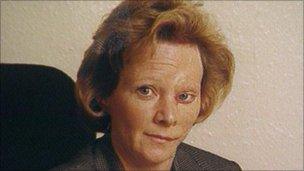
Solicitor Rosemary Nelson represented the Garvaghy Road residents during the Drumcree conflict
At a press conference, spokesperson Dr Robbie McVeigh said: "Justice must be done and must be seen to be done in this case.
"If the RUC or other security forces were involved in collusion in the murder then this must be exposed," he said.
"If not they have nothing to fear from an independent investigation and indeed should welcome it."
15 March 2000
On the first anniversary of her murder, calls for an inquiry are renewed.
An open letter from Mrs Nelson's family and a petition containing approximately 100,000 signatures is handed over to UK Prime Minister Tony Blair.
20 February 2001
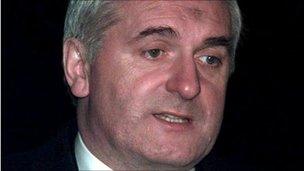
Irish prime minister Bertie Ahern backed calls for a public inquiry into the murder
Irish Prime Minister Bertie Ahern backs calls for an investigation.
Speaking after a meeting with campaigners in Dublin, Mr Ahern said: "It is essential that the truth be established in a manner which will command the confidence of the whole community.
"For this reason, I am of the view that an independent, judicial public inquiry needs to be established into all of the circumstances surrounding her death."
1 April 2004
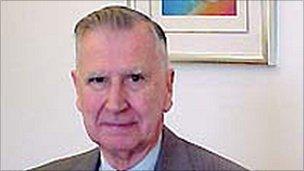
Canadian Judge Peter Cory recommended a public judicial inquiry into the murder
After commissioning a report by retired Canadian Judge Peter Cory in 2001, which investigated a total of eight sectarian killings in Ireland, the British Government announces its intention to hold a public inquiry "as soon as possible".
Northern Ireland secretary Paul Murphy said that the Nelson inquiry would examine the actions of the police and the Northern Ireland Office.
There was criticism surrounding the handling of the Cory reports in 2003, after the findings were not made public for six months.
16 November 2004
Mr Murphy names the three-member panel to chair the inquiry.
They are: retired judge Sir Michael Morland, Dame Valerie Strachan, former chairman of the board of Customs and Excise, and Sir Anthony Burden, former Chief Constable of South Wales Police.
Mr Murphy also announces that the scope of the inquiry will include allegations of collusion by security forces and the issue of possible negligence.
19 April 2005
The inquiry formally opens at Craigavon Civic Centre in County Armagh. Sir Morland stressed that it would be "completely independent" of the government.
Mrs Nelson's brother, Eunan Magee, said there was a "long and arduous journey ahead, so we'll adopt a wait-and-see approach".
15 December 2005
The inquiry is delayed until at least January 2007, as it is taking a long time to gather and sift through evidence.
In a statement the inquiry said a "further year of hard work" would be needed to prepare properly for the full hearings in Belfast.
21 September 2006
Controversy as it is announced that MI5 will have legal representation at the public inquiry.
Mrs Nelson's family express concern that the organisation might consequently be able to apply to remove sensitive or classified information in the papers.
25 October 2006
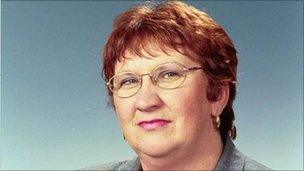
The SDLP's Dolores Kelly was critical of the continuing delays
The inquiry is delayed again, this time until September 2007 at the earliest.
The panel said that it would not be possible to complete outstanding work to allow the full hearing to begin as planned the following January.
SDLP assembly member Dolores Kelly said: "It is always a bad idea to delay inquiries of this kind, because justice delayed can indeed be justice denied."
19 September 2007
Police Ombudsman Nuala O'Loan rules that threats made against Mrs Nelson months before her death were not properly investigated by the RUC.
15 April 2008
After almost exactly three years, the public inquiry finally opens in Belfast. Its opening statement reads:
"It will be our task over the months of these hearings to investigate and probe these and other matters which include very troubling suggestions, at their highest of state involvement in the murder of one of the state's own citizens, in a dispassionate and calm way so that the truth is not itself obscured by emotion, preconception or prejudice."
1 December 2008
The inquiry hears allegations that Mrs Nelson passed confidential case information to IRA members.
It is also alleged that she was having an affair with Colin Duffy, who is described by a police officer giving evidence as a "prominent" IRA member.
Nelson family lawyers dismiss the claims as "malicious rumours".
19 - 21 January 2009
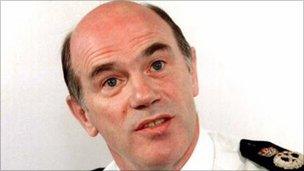
Chief Constable Sir Ronnie Flanagan faced three days of questioning
Three days of the inquiry are set aside to hear evidence from former Northern Ireland Chief Constable Sir Ronnie Flanagan.
Mr Flanagan denies any knowledge of security files kept on Mrs Nelson.
He claims that in the absence of any information about a direct threat, police could not have saved Mrs Nelson, whom he describes as "a lawyer doing her job."
24 June 2009
After hearing 130 days of conflicting testimonies, the inquiry begins its final report. The panel must now undertake a review of written submissions, transcripts of oral statements and hundreds of pages of unpublished intelligence material.
9 May 2011
Secretary of State Owen Paterson announces that, after more than six years of delays, hearings and intense scrutiny, and at an estimated cost of £46.1m, the findings of the inquiry will be announced on 23 May.